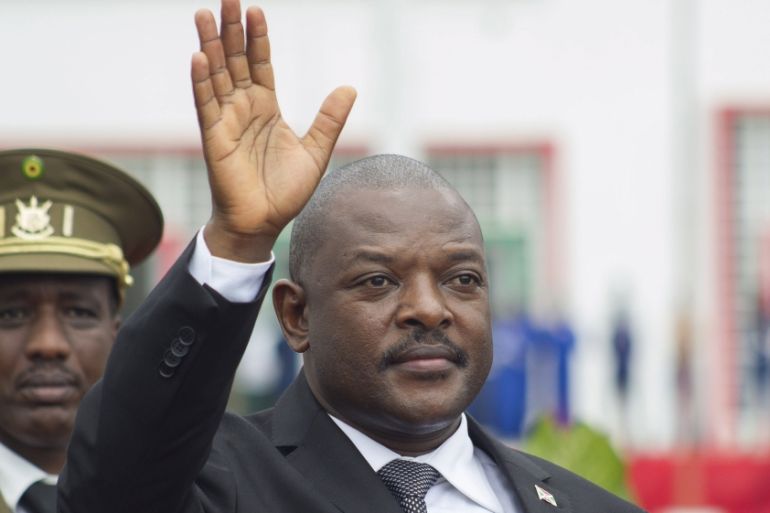Burundi bans BBC and Voice of America before referendum
Six-month suspension comes weeks before vote that could see presidential terms extended from five years to seven.

Authorities in Burundi have banned the BBC and Voice of America (VOA), as well as two local broadcasters, just weeks before a crucial constitutional referendum on presidential term limits.
The National Communications Council (NCC) said on Friday that the news organisations’ operations would be suspended for at least six months for breaching the “laws governing the press and ethics.”
Keep reading
list of 4 itemsGeorgia advances ‘foreign agents’ bill as 20,000 rally against it
Lawmakers brawl as Georgian Parliament considers ‘foreign agent’ bill
Journalist loses foot after being badly wounded in Israeli attack in Gaza
The ban will come into effect on Monday, Karenga Ramadhani, the head of the regulator, told journalists in the capital, Bujumbura.
The NCC said the BBC invited a Burundian who made “inappropriate, exaggerated, non-verified [remarks], damaging the reputation of the head of state, to ethnic hatred, to political conflict and civil disobedience”.
VOA, for its part, was accused of spreading “very tendentious” information and hiring a journalist “sought by Burundian justice”, according to AFP news agency.
French broadcaster Radio France International was also issued a stern warning in the same statement, and was asked to put a more vigorous verification process in place.
Two local broadcasters were also banned after the presidency complained their reporting was biased, the National Communications Council said.
The BBC and VOA both broadcast daily in the national Kirundi language and have amassed a large following over the years, especially in rural areas.
Amanda Bennett, VOA’s director, denounced the regulator’s action and said the news organisation’s content would continue to be available through its shortwave channels, online and on FM transmitters located in neighbouring countries.
“Our audience members count on VOA to provide factual, unbiased and objective coverage of current events, so this ban deprives the citizens of Burundi of a trusted news source during a critical time in that country,” she said in a statement.
“This is even more distressing coming only one day after World Press Freedom Day – a day calling for governments to remove, not impose, restrictions on the media,” Bennett added.
Key referendum
While the country’s constitution currently limits presidents to two five-year terms, a “yes” vote in the upcoming referendum on May 17 could allow President Pierre Nkurunziza, 54, to run for an additional two seven-year terms.
In concrete terms, this would mean that Nkurunziza, in power since 2005, could potentially rule until 2034 if he is re-elected in the next scheduled election in two years.
His run for a controversial third term in 2015 triggered a deep political crisis that has since seen 1,200 people killed and 400,000 flee their homes in the country of 10.5 million.
“Conditions for holding a credible referendum deteriorate as days go by,” Leonce Ngendakumana, deputy chairman of the opposition party FRODEBU, the Front for Democracy in Burundi, told the Reuters news agency.
“The regime is now afraid of the media’s force, which can derail their plan for the upcoming referendum and the 2020 elections.”
Also commenting on the regulator’s announcement, Lews Mudge, a senior researcher in Human Rights Watch‘s Africa division, called the broadcasting ban “worrying”.
“This falls in line with the repression in Burundi as we head closer to the referendum,” Mudge told Reuters.
“This is happening in the context of journalists getting threatened, those reporting on some of the oppression are being muzzled.”
Earlier this week, Heather Nauert, spokesperson for the US Department of State, denounced alleged acts of violence against the opposition and called on the Burundian government to respect its international commitments to protect freedoms of speech and association.
“We call on the government to respect Burundi’s international legal obligations regarding the rights to freedom of expression, peaceful assembly and association,” Nauert said on Tuesday.
The World Press Freedom Index, compiled by Reporters without Borders, ranks Burundi 159 out of a total 180 countries for press freedoms.